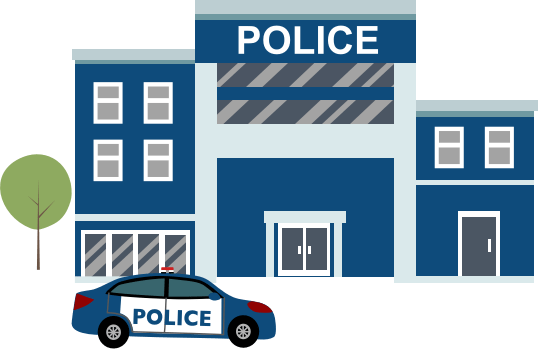Reporting Fraud
In the case of an emergency, dial 9-1-1.
The first step is to report the fraud to your local police.
The first step is to report the fraud to your local police service. If your local police service is the OPP, use the detachment locator to find your nearest detachment.
You have different options to report fraud to your local police, depending on where you live. You can:
- Report in-person by attending your local police service.
- Report over the phone by calling your local police service.
You are also encouraged to report the incident to the Canadian Anti-Fraud Centre (CAFC). You can contact the CAFC toll free by calling 1 888 495-8501 or through the Fraud Reporting System.

What do you need to make a report?
- Personal identification that may have been provided during the fraud.
- Any supporting documents related to the fraud; including receipts, correspondence, financial documents/statements, emails, or social media information.
- A detailed chronology of the events related to the fraud.
What happens next?
- The police may request a detailed statement of the incident.
- Ensure you obtain a file/report number associated to the police report and contact information for the officer, should you have additional information to provide.
- The officer will keep you updated on the status of the investigation.
- It is important to remember that fraud investigations are complex, and they may take considerable time to investigate.
The rights of victims of crime must be considered during every stage of the criminal justice process by police, prosecutors, courts, review boards, correction and parole boards. As a victim of crime, you have the right to information, to participation, to seek restitution, and to protection. To find out more information about your rights: Victim Rights.
Why should you report to police?
Reporting fraud makes police aware of ongoing fraud trends targeting people across the province. This provides the police with information to notify the public of potential fraud risks. The police are able to provide crime prevention efforts and resources to best protect the community. When reported to police, an investigation may be initiated.
Why should you report to the Canadian Anti-Fraud Centre (CAFC)?
If you have experienced fraud, you are encouraged to report it to the CAFC. While the CAFC does not investigate fraud, they share the information they receive with police services to help prevent more people in Ontario from becoming victims.
Reasons to report to the CAFC:
- Your information could link several crimes together, in Canada and abroad.
- Your report could help progress or complete an investigation.
- Reports help illustrate crime trends and allow for crime forecasting.
- The information helps law enforcement, businesses and researchers learn about fraud and work on prevention and awareness efforts.
How to report:
- Phone: Toll free at 1 888 495-8501
- Online: Report online to CAFC
If you are still unsure if you should report.
You are not alone. Here are some reasons why victims of fraud may feel hesitant to report what happened.
You think what happened to you is not worth reporting to the police.
If you think that what happened to you is not serious enough to report to the police, start with reporting the fraud to the Canadian Anti-Fraud Centre (CAFC). The CAFC collects information on fraud complaints. By reporting fraud to the CAFC, it ensures the CAFC and police services are aware of which frauds are targeting people across the province and Canada. The CAFC can also speak with you about the reporting process and provide information that may help you decide if you want to report to the police.
You feel ashamed or afraid of what people will think if you report.
It is important to remember that fraud can happen to anyone. Sharing your experience with others, whether or not you have lost money, can help prevent them from being victimized by the same or a similar fraud.
You feel that reporting will take away your legal or financial control.
When you report to the police, it is up to the investigators and Crown Counsel to decide if charges will be filed and prosecuted. Regardless of the criminal court's outcome, you can still pursue your own legal actions in civil court. It is a good idea to keep copies of all documents you give to investigators for your own records.
You feel concerned about your safety or retaliation from the accused if you report.
If you have safety concerns, police and victim service agencies can assist you with safety planning. Staff are trained to assist victims and witnesses of crimes with creating personalized plans and strategies to maintain safety.
You have reservations about participating in the criminal justice system.
Reporting fraud to the police or the CAFC does not guarantee that charges will be laid. However, it makes police services aware of the fraud, which helps with crime prevention efforts. This means the public can be warned about the fraud, reducing further victimization. If charges are laid, Crown Counsel will present the facts of the case, and the Judge will decide on the appropriate sentencing.
The financial and emotional impact is so significant that re-telling it or re-living it does not feel manageable.
It can be overwhelming to talk about something so personal. Being a victim can bring up feelings of shame, sadness and vulnerability. Supports are available through victim services, victim liaisons, and community programming to assist you in making an emotional recovery.
